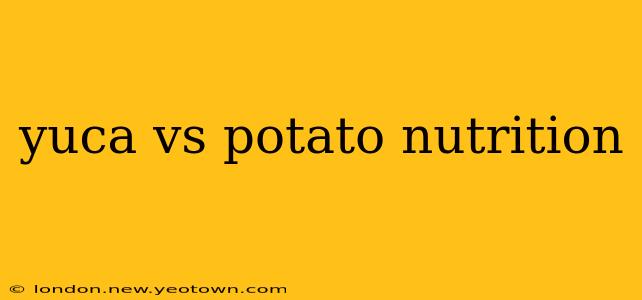For centuries, both yuca and potatoes have served as dietary staples across the globe, providing essential carbohydrates and sustenance to countless populations. But when it comes to nutrition, how do these two root vegetables really stack up against each other? This isn't just a simple "one's better than the other" situation; it's a nuanced comparison that depends on individual dietary needs and preferences. Let's delve into the details, exploring the nutritional profiles of yuca and potatoes to help you make informed choices about which to incorporate into your diet.
Yuca: The Tropical Tuber
Imagine yourself strolling through a vibrant tropical marketplace, the air thick with the scent of ripe mangoes and exotic spices. There, nestled among piles of colorful fruits and vegetables, sits the yuca – a sturdy, brown-skinned root vegetable with a slightly starchy, slightly sweet interior. This humble tuber, also known as cassava, holds a significant place in the culinary traditions of many regions, particularly in Latin America and Africa.
Yuca boasts a remarkably high carbohydrate content, providing a good source of energy. However, it’s relatively low in protein and fat. Its nutritional profile shines particularly bright when it comes to certain vitamins and minerals:
What vitamins and minerals are in yuca?
Yuca is a good source of vitamin C, a potent antioxidant vital for immune function and collagen production. It also contains decent amounts of vitamin B6, crucial for brain development and function, and potassium, an electrolyte essential for maintaining healthy blood pressure. While not as rich in other vitamins and minerals as some other vegetables, yuca's contribution shouldn't be overlooked, especially in regions where it is a primary food source.
Potatoes: The Humble Staple
The potato, a true global icon, requires no introduction. From crispy French fries to creamy mashed potatoes, this versatile tuber has conquered kitchens and hearts worldwide. It's a powerhouse of carbohydrates, providing a substantial energy boost, but its nutritional value extends beyond just simple sugars.
Are potatoes a good source of protein?
While not a major source of protein, potatoes do offer a modest amount. More significantly, they are packed with vitamin C, potassium, and fiber. The amount of fiber, particularly in the skin, contributes to digestive health and satiety. Different varieties of potatoes offer slightly different nutrient profiles, with sweet potatoes, for example, being richer in beta-carotene (a precursor to vitamin A).
Yuca vs. Potato: A Side-by-Side Comparison
To understand the differences more clearly, let's compare the key nutritional components directly. Note that the exact values can vary based on factors such as the specific variety, growing conditions, and preparation method:
| Nutrient | Yuca (1 cup, boiled) | Potato (1 medium, baked) |
|---|---|---|
| Calories | ~170 | ~160 |
| Carbohydrates | ~40g | ~37g |
| Fiber | ~5g | ~3g |
| Protein | ~2g | ~4g |
| Vitamin C | ~20% DV | ~20% DV |
| Potassium | ~12% DV | ~10% DV |
| Vitamin B6 | ~10% DV | ~5% DV |
(Note: DV refers to Daily Value. Percentages may vary depending on recommended daily intake guidelines.)
Which is healthier: yuca or potato?
There's no single "healthier" choice between yuca and potatoes. Both offer valuable nutrients and contribute to a balanced diet. The best choice depends on your individual needs and preferences. If you need a food rich in fiber, yuca might be slightly better. If you're looking for a higher protein source, potatoes have a slight edge. Both are excellent sources of vitamin C and potassium.
Are yuca and potatoes good for weight loss?
Both yuca and potatoes are relatively high in carbohydrates, which can contribute to weight gain if consumed in excess. However, they can be part of a healthy weight-loss diet if portioned correctly and combined with other nutritious foods. The fiber content in both can aid in satiety, helping you feel full for longer.
What are the differences between yuca and potatoes?
The primary differences lie in their flavor profiles and textures. Yuca has a slightly sweeter and nuttier taste than potatoes, and its texture can range from slightly firm to quite starchy depending on the preparation method. Potatoes, on the other hand, offer a greater variety of textures and flavors, ranging from fluffy russets to waxy reds.
Can I eat yuca every day?
While yuca is a nutritious food, it's generally not recommended to eat it exclusively every day due to its relatively limited nutrient profile compared to a more diverse diet. Variety is key to obtaining all the nutrients your body needs.
Ultimately, the choice between yuca and potatoes depends on your personal dietary needs, preferences, and the overall balance of your diet. Both are valuable sources of carbohydrates, vitamins, and minerals and can contribute to a healthy lifestyle when consumed as part of a varied and balanced diet.

